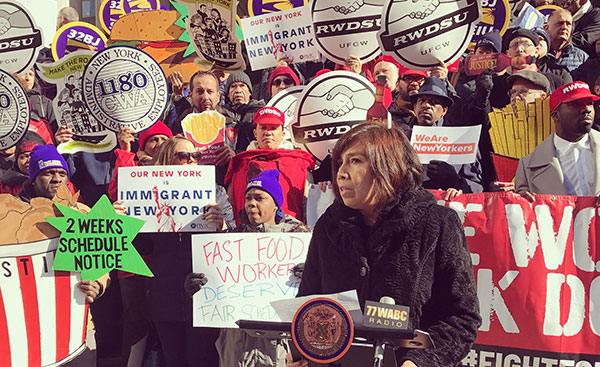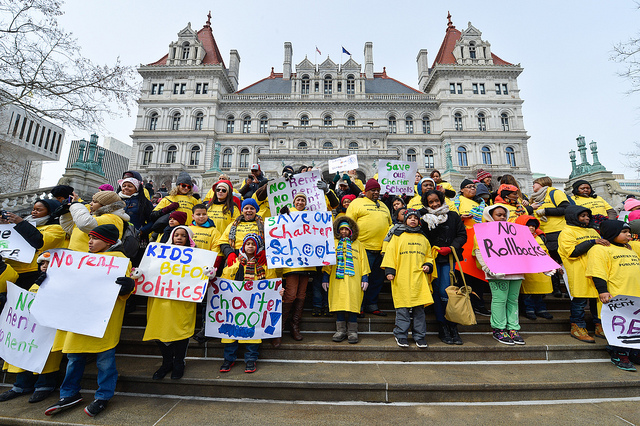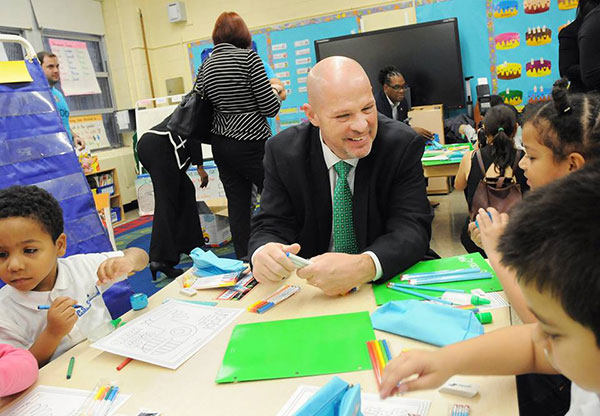Take a Stand for Workers’ Rights on May Day and Every Day

DCA Commissioner Lorelei Salas, the author
Sitting in front of more than 150 people, Maria Aguilar broke down in tears as she shared how often she experiences discrimination and abuse at the hands of her employers. Maria is a day laborer at “La Parada,” a street corner in Williamsburg where every day she waits and hopes for the chance to be picked up by someone looking for last-minute child care or housekeeping services. Maria is almost always a victim of wage theft and despite working long days and weeks she does not get paid minimum wage, let alone the overtime wages she is owed. After years of toiling under terrible conditions, she joined other day laborers and formed a worker co-op of cleaners with the hopes of regaining some sense of control over who she works for, and on what terms.
She is one of the “lucky” ones. Most workers may never get to set the terms of their employment. Take Pierre, a young father and husband working for a fast food restaurant, who choked up as he told us how he had to wait until Sunday to figure out which two or three days he might be scheduled to work that week, and having to choose between putting food on the table or paying his phone bill. Or Nereyda, a transgender Latina and member of Make the Road New York, who experienced sexual harassment and wage theft at the restaurant where she worked. When she finally obtained a court decision in her favor, her employer went bankrupt and shut down to avoid having to pay her back wages.
New York City stands against these and other exploitative labor practices; we are committed to protecting all New Yorkers regardless of national origin, race, religion/creed, gender, and gender identity.
Mayor de Blasio‘s legislative proposal to address the terrible scheduling practices in the fast food industry by requiring employers to give advance notice to workers of their schedules will make it so that workers like Pierre can plan ahead and know how much money they will bring home. And as our Office of Labor Policy and Standards (OLPS) gets ready to implement the Freelance Isn’t Free Act, gig economy workers will get assistance in recouping money they are owed and navigating the court system. We are building a new generation of workplace protections, and just in time.
A few days ago, the Department of Consumer Affairs’ Office of Labor Policy and Standards (OLPS), along with the city’s Commission on Human Rights and the Mayor’s Office of Immigrant Affairs, held a public hearing on the state of workers’ rights at LaGuardia Community College in Long Island City. We took testimony from nearly 50 workers in the construction, fast food and retail, home health care, restaurant, and taxi industries. I have spent nearly 20 years working in the field of labor compliance at all levels of government, and the stories of rampant wage theft and unsafe workplaces that we heard struck a very familiar chord with me. What I found even more alarming was that the exploitative conditions these workers endure do not discriminate. They have spread across countless industries and span racial and socio-economic divides.
While we wait to see what direction the Trump administration takes in terms of enforcing key workplace protections, we are preparing for the worst. A proposed $2.5 billion budget cut for the United States Department of Labor could result in a gutting of enforcement staff and further deterioration of working conditions. Now more than ever, it will be up to progressive cities and states to step up enforcement efforts and fill the gap left by the federal government.
New York City, led by Mayor de Blasio, is doing just that. We have been enforcing New York’s Paid Sick Leave Law for just over three years, and since January, we have seen a 30 percent increase in the number of complaints filed against employers not following the law. We are encouraged by the fact that people are not shying away from coming to us for help, but this troubling trend coincides with the timing of anti-immigrant policies coming out of D.C.
Today -- Monday, May 1, or May Day -- will be filled with marches and protests, and everyone who cares about workers’ rights, including those at my agency, will be seeking to elevate the issues that plague workers in this country. It has become ever clearer that worker exploitation is an equal opportunity evil that cannot be condemned just once a year. We need to devote more time and resources to filling current labor gaps if we hope to secure a safer and stronger workplace for our children.
***
Lorelei Salas is the Commissioner of the Department of Consumer Affairs, which houses the Office of Labor Policy and Standards. Workers can learn more about what the office does at nyc.gov/dca or by calling 311. On Twitter at @NYCDCA.
***
Have an op-ed idea or submission for Gotham Gazette? Email This email address is being protected from spambots. You need JavaScript enabled to view it.
Passing New York’s Next School Discipline Test

A charter school rally at the Capitol (photo: The Governor's Office)
UFT President Michael Mulgrew raises important points about the negative impact of suspensions in his recent op-ed, “Charter Schools Can’t Suspend Their Way to Success.”
There is no disputing Mr. Mulgrew’s argument that the excessive use of suspensions and other exclusionary disciplinary practices means that students (and especially students of color) miss out on class time and their education permanently suffers. No school – regardless of whether it’s a public charter school or district public school – should ever be able to “suspend its way to success.”
The good news is that New York can do something about it – right now.
In Albany, state leaders are working on a major overhaul of how New York measures school performance and provides urgency, resources, and support to help schools that are not succeeding for any group of students. These changes are possible under a federal education law that President Obama signed, called the Every Student Succeeds Act (ESSA).
While academic measures like reading and math achievement must – and should – remain the most important aspect of how we measure school performance, there’s also room for a small number of additional measures of school quality and student success that capture other important student outcomes that schools can control and that have a clear link to achievement.
Without a doubt, reducing suspensions meets those criteria.
A recent study by the California Dropout Research Project and The Civil Rights Project at the University of California found that “suspensions themselves directly reduce the graduation rates of suspended students” – resulting in a 6.5 percentage point difference in high school graduation rates.
Our own research at The Education Trust--New York found that across New York State, African-American elementary and middle school students are nearly four times as likely as their white peers to receive at least one out-of-school suspension, and African-American high school students are twice as likely as their white peers to be suspended. The challenge is not limited to New York City, and it’s not unique to charter schools.
We – along with a statewide coalition of civil rights, education, parent, and business organizations committed to advancing equity through ESSA – believe that schools should be held accountable for reducing the overuse of exclusionary discipline measures, including in- and out-of-school suspensions, expulsions, seclusions/restraints, and school-based arrests.
Of course, just including discipline in our accountability system is not sufficient. We also need the resources to support teachers and principals in enacting restorative justice practices and establishing positive school environments. Including discipline in our accountability system can help create the urgency to provide these critical tools so our schools can truly address the problem and improve the learning environment for all students.
Other states are already taking advantage of ESSA to show they are serious about reducing excessive discipline. In Louisiana, for example, the state’s new accountability system would require support and improvement in schools that have high rates of suspensions.
Does New York’s State Education Department agree that efforts to reduce excessive suspensions should have real teeth?
We’ll find out in just a few short weeks, when they present their draft accountability plan to the Board of Regents and the public.
***
Ian Rosenblum is the executive director of The Education Trust--New York. On Twitter @EdTrustNY.
***
Have an op-ed idea or submission for Gotham Gazette? Email This email address is being protected from spambots. You need JavaScript enabled to view it.
Charter Schools Can't Suspend Their Way to Success

Michael Mulgrew, the author (photo: UFT)
Children who miss 20 or more days of school in New York City have lost so much instruction time that they are classified as chronically absent, which studies have linked to lower test scores and higher dropout rates.
So it is hard to see the educational purpose behind Success Academy's suspending a special-needs 7-year-old for 45 days, even if some form of alternative instruction was provided. This one recent example is part of a much larger pattern, both for Success Academy and the larger charter school sector it is the leader of.
Sadly, Success Academy is far from the outlier in the charter sector in the use of suspensions as a punitive tool.
A 2016 study by the Center for Civil Rights Remedies at the University of California, Los Angeles, found charters nationwide suspended African-American and special-needs students at a disproportionately higher rate than their white or non-disabled classmates. The report was the first national review of charter school discipline.
In New York City, although the charter school student population was less than 7 percent of the system's total enrollment, charter schools accounted for nearly 42 percent of all suspensions, according to a review by The Atlantic of 2014 state suspension data.
Charter schools accounted for 48 of the top 50 New York City schools with the highest suspension rates for the same year. The Icahn Charter #7 in the Bronx reported giving out 142 suspensions to its 99 students that year, the highest suspension rate in the city. Achievement First Crown Heights Charter reported issuing 200 suspensions to its roughly 940 students that same year.
Teachers know that there is a place for suspension of children who are dangerous to themselves or others, or who constantly make learning impossible for their classmates. The UFT fought to ensure that the system's new discipline policy included the ability for a principal to suspend even the youngest children, though the potential loss of learning time means that suspension should always be a last resort.
But we also know that it takes time, energy, and public scrutiny to move from punitive, after-the-fact discipline codes to pro-active, restorative practices that can change school climate. At the UFT, we have joined with the city Department of Education to create a package of training and techniques to help staff identify and deal with issues proactively, known as the Positive Learning Collaborative.
At schools enrolled for three years in this joint venture, suspensions are down, as are the kinds of incidents that used to trigger them. And perhaps more important, the satisfaction of children, staff, and parents in the schools is up.
Charters need to do similar work, and do it publicly to regain the trust of the public, particularly parents and students.
***
Michael Mulgrew is president of the United Federation of Teachers. On Twitter @UFT.
***
Have an op-ed idea or submission for Gotham Gazette? Email This email address is being protected from spambots. You need JavaScript enabled to view it.




